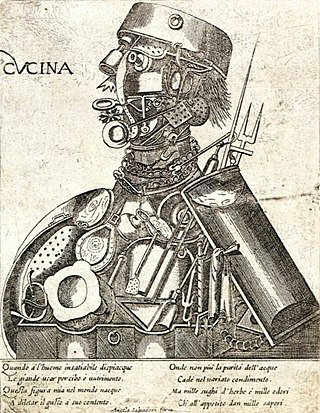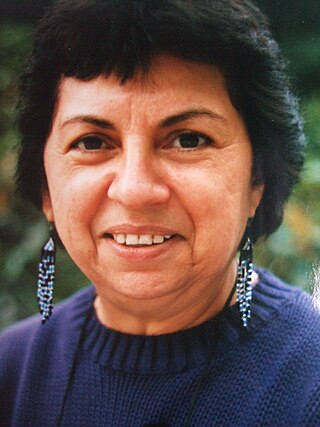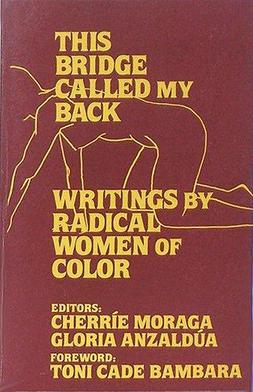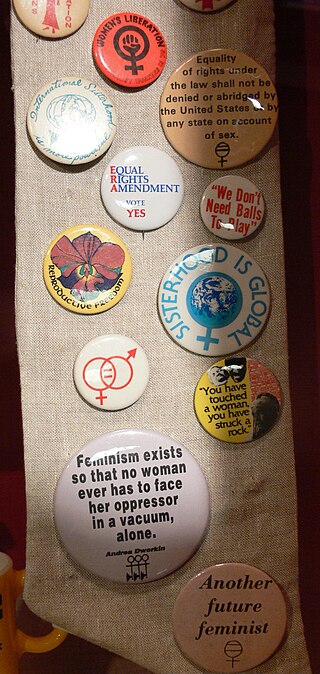Related Research Articles

Donna J. Haraway is an American professor emerita in the history of consciousness and feminist studies departments at the University of California, Santa Cruz, and a prominent scholar in the field of science and technology studies. She has also contributed to the intersection of information technology and feminist theory, and is a leading scholar in contemporary ecofeminism. Her work criticizes anthropocentrism, emphasizes the self-organizing powers of nonhuman processes, and explores dissonant relations between those processes and cultural practices, rethinking sources of ethics.

Teresa de Lauretis is an Italian author and Distinguished Professor Emerita of the History of Consciousness at the University of California, Santa Cruz. Her areas of interest include semiotics, psychoanalysis, film theory, literary theory, feminism, women's studies, lesbian- and queer studies. She has also written on science fiction. Fluent in English and Italian, she writes in both languages. Additionally, her work has been translated into sixteen other languages.

"A Cyborg Manifesto" is an essay written by Donna Haraway and published in 1985 in the Socialist Review. In it, the concept of the cyborg represents a rejection of rigid boundaries, notably those separating "human" from "animal" and "human" from "machine." Haraway writes: "The cyborg does not dream of community on the model of the organic family, this time without the oedipal project. The cyborg would not recognize the Garden of Eden; it is not made of mud and cannot dream of returning to dust."

Lesbian feminism is a cultural movement and critical perspective that encourages women to focus their efforts, attentions, relationships, and activities towards their fellow women rather than men, and often advocates lesbianism as the logical result of feminism. Lesbian feminism was most influential in the 1970s and early 1980s, primarily in North America and Western Europe, but began in the late 1960s and arose out of dissatisfaction with the New Left, the Campaign for Homosexual Equality, sexism within the gay liberation movement, and homophobia within popular women's movements at the time. Many of the supporters of Lesbianism were actually women involved in gay liberation who were tired of the sexism and centering of gay men within the community and lesbian women in the mainstream women's movement who were tired of the homophobia involved in it.
Feminist legal theory, also known as feminist jurisprudence, is based on the belief that the law has been fundamental in women's historical subordination. Feminist jurisprudence the philosophy of law is based on the political, economic, and social inequality of the sexes and feminist legal theory is the encompassment of law and theory connected. The project of feminist legal theory is twofold. First, feminist jurisprudence seeks to explain ways in which the law played a role in women's subordinate status. Feminist legal theory was directly created to recognize and combat the legal system built primarily by the and for male intentions, often forgetting important components and experiences women and marginalized communities face. The law perpetuates a male valued system at the expense of female values. Through making sure all people have access to participate in legal systems as professionals to combating cases in constitutional and discriminatory law, feminist legal theory is utilized for it all.

Gloria Evangelina Anzaldúa was an American scholar of Chicana feminism, cultural theory, and queer theory. She loosely based her best-known book, Borderlands/La Frontera: The New Mestiza (1987), on her life growing up on the Mexico–Texas border and incorporated her lifelong experiences of social and cultural marginalization into her work. She also developed theories about the marginal, in-between, and mixed cultures that develop along borders, including on the concepts of Nepantla, Coyoxaulqui imperative, new tribalism, and spiritual activism. Her other notable publications include This Bridge Called My Back: Writings by Radical Women of Color (1981), co-edited with Cherríe Moraga.
Postmodern feminism is a mix of postmodernism and French feminism that rejects a universal female subject. The goal of postmodern feminism is to destabilize the patriarchal norms entrenched in society that have led to gender inequality. Postmodern feminists seek to accomplish this goal through opposing essentialism, philosophy, and universal truths in favor of embracing the differences that exist amongst women in order to demonstrate that not all women are the same. These ideologies are rejected by postmodern feminists because they believe if a universal truth is applied to all women of society, it minimizes individual experience, hence they warn women to be aware of ideas displayed as the norm in society since it may stem from masculine notions of how women should be portrayed.
Cyberfeminism is a feminist approach which foregrounds the relationship between cyberspace, the Internet, and technology. It can be used to refer to a philosophy, art practices, methodologies or community. The term was coined in the early 1990s to describe the work of feminists interested in theorizing, critiquing, exploring and re-making the Internet, cyberspace and new-media technologies in general.
Standpoint feminism is a theory that feminist social science should be practiced from the standpoint of women or particular groups of women, as some scholars say that they are better equipped to understand some aspects of the world. A feminist or women's standpoint epistemology proposes to make women's experiences the point of departure, in addition to, and sometimes instead of men's.

Chicana feminism is a sociopolitical movement, theory, and praxis that scrutinizes the historical, cultural, spiritual, educational, and economic intersections impacting Chicanas and the Chicana/o community in the United States. Chicana feminism empowers women to challenge institutionalized social norms and regards anyone a feminist who fights for the end of women's oppression in the community.
History of Consciousness is the name of a department in the Humanities Division of the University of California, Santa Cruz with a 50+ year history of interdisciplinary research and student training in "established and emergent disciplines and fields" in the humanities, arts, sciences, and social sciences based on a diverse array of theoretical approaches. The program has a history of well-known affiliated faculty and of well-known program graduates.
Feminist epistemology is an examination of epistemology from a feminist standpoint.

This Bridge Called My Back: Writings by Radical Women of Color is a feminist anthology edited by Cherríe Moraga and Gloria E. Anzaldúa first published in 1981 by Persephone Press. The book centers on the experiences of women of color and emphasizes the points of what is now called intersectionality within their multiple identities, challenging white feminists who made claims to solidarity based on sisterhood. Writings in the anthology, along with works by other prominent feminists of color, call for a greater prominence within feminism for race-related subjectivities, and ultimately laid the foundation for third wave feminism. It is among the most cited books in feminist theory.

A variety of movements of feminist ideology have developed over the years. They vary in goals, strategies, and affiliations. They often overlap, and some feminists identify themselves with several branches of feminist thought.
Caren Kaplan is professor emerita of American Studies at University of California at Davis, and a figure in the academic discipline of women's studies. Together with Inderpal Grewal, Kaplan has worked as a founder of the field of transnational feminist cultural studies or transnational feminism.

Chicana literature is a form of literature that has emerged from the Chicana Feminist movement. It aims to redefine Chicana archetypes, in an effort to provide positive models for Chicanas. Chicana writers redefine their relationships with what Gloria Anzaldúa has called "Las Tres Madres" of Mexican culture, by depicting them as feminist sources of strength and compassion.
Cindy Cruz is an urban ethnographer and educational researcher. She is an associate professor in the Department of Teaching, Learning and Sociocultural Studies at the University of Arizona. She is also a member of the National Association of Chicana/o Studies, the American Educational Research Association, and the American Anthropological Association. Her research looks at the embodied practices of resistance in homeless LGBT youth communities, violence and youth, problems in testimonio methods, and the school-to-prison pipeline. She is also interested in decolonial feminist theory, community-based learning, race and schooling, and U.S. Third World feminism.
Multiracial feminist theory refers to scholarship written by women of color (WOC) that became prominent during the second-wave feminist movement. This body of scholarship "does not offer a singular or unified feminism but a body of knowledge situating women and men in multiple systems of domination."

Emma Pérez is an American author and professor, known for her work in queer Chicana feminist studies.

The term Chicanafuturism was originated by scholar Catherine S. Ramírez which she introduced in Aztlán: A Journal of Chicano Studies in 2004. The term is a portmanteau of 'chicana' and 'futurism'. The word 'chicana' refers to a woman or girl of Mexican origin or descent. However, 'Chicana' itself serves as a chosen identity for many female Mexican Americans in the United States, to express self-determination and solidarity in a shared cultural, ethnic, and communal identity while openly rejecting assimilation. Ramírez created the concept of Chicanafuturism as a response to white androcentrism that she felt permeated science-fiction and American society. Chicanafuturism can be understood as part of a larger genre of Latino futurisms.
References
- ↑ "Chela Sandoval, Ph.D.: Faculty Page, UCSB". University of California, Santa Barbara. Archived from the original on 23 December 2012. Retrieved 9 July 2013.
- ↑ Sandoval, Chela (1991). "U.S. Third World Feminism: The Theory and Method of Oppositional Consciousness in the Postmodern World". Genders. 10: 1–24.
- ↑ Angela Y. Davis, Foreword, in Sandoval, Chela (2000). Methodology of the oppressed ([Online-Ausg.] ed.). Minneapolis, Minn.: University of Minnesota Press. ISBN 0816627371.
- ↑ Osa Hidalgo de la Riva, Interview with Chela Sandoval, Spectator 26.1(Spring 2006):89. http://cinema.usc.edu/archivedassets/097/15705.pdf
- ↑ Sandoval, Methodology of the Oppressed, xvi
- ↑ de la Riva, Interview with Chela Sandoval, Spectator, 89. http://cinema.usc.edu/archivedassets/097/15705.pdf
- ↑ Osa Hidalgo de la Riva, Interview with Chela Sandoval, Spectator 26.1(Spring 2006):91 http://cinema.usc.edu/archivedassets/097/15705.pdf
- ↑ Sandoval, Methodology of the Oppressed, xv
- ↑ Oppositional consciousness in the postmodern world: U.S. third world feminism, semiotics, and the methodology of the oppressed Thesis (Ph. D.)--University of California, Santa Cruz, 1993. http://www.worldcat.org/oclc/213868615
- ↑ Teresa Cordova (January 1994). "Roots and Resistance: The Emergent Writing of Twenty Years of Chicana Feminist Struggle". In Nicolás Kanellos (ed.). Handbook of Hispanic Cultures in the United States: Sociology. Arte Publico Press. pp. 186–. ISBN 978-1-61192-165-6.
- ↑ Cordova, Teresa (1994). "Roots and Resistance: The Emergent Writing of Twenty Years of Chicana Feminist Struggle". In Nicolás Kanellos (ed.). Handbook of Hispanic Cultures in the United States: Sociology. Houston, TX: Arte Publico Press. p. 186.
- ↑ Nancy A. Hewitt (January 2010). No Permanent Waves: Recasting Histories of U.S. Feminism. Rutgers University Press. pp. 384–. ISBN 978-0-8135-4724-4.
- ↑ Sandoval, U.S. Third World Feminism, 18 fn1
- ↑ Jose David Saldivar (1997). Border Matters: Remapping American Cultural Studies . University of California Press. pp. 209–. ISBN 978-0-520-20682-3.
- ↑ Robert J. Corber (1997-05-22). Homosexuality in Cold War America: Resistance and the Crisis of Masculinity. Duke University Press. p. 199. ISBN 0-8223-8244-X.
- ↑ Clara Román-Odio "Transnational Feminism, Globalization, and the Politics of Representation: Chicana Visual Art" in Marta Sierra and Clara Román-Odio eds Transnational Borderlands in Women's Global Networks: The Making of Cultural Resistance, Palgrave Macmillan 2011, 25.
- ↑ Sandoval, Chéla (1994). "Re-entering cyberspace: Sciences of resistance". Dispositio. 19 (46). Center for Latin American and Caribbean Studies University of Michigan: 75–93. JSTOR 41491506.
- ↑ Feminist Theory Archives